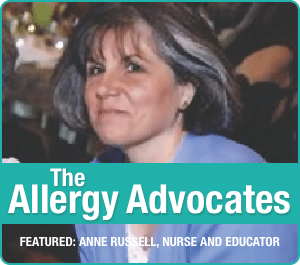
She’s a passionate advocate for students, and was instrumental in supporting Michigan’s mandate for school stock epinephrine law which came into effect in the fall of 2014. She is now working on what she calls the “next step” toward greater safety at schools: helping to develop state-wide, voluntary recommendations for food allergy management at school.
She’s an adviser in the food allergy community, has served on the airline safety task force for FARE (Food Allergy Resource and Education), and she previously served on FAAN’s member advisory council. She has developed food-allergy curriculum programming and presented to numerous daycares and schools and at state and national conferences on the topic of food allergy management.
Russell is committed to educating people about food allergies – for 15 years she ran a non-profit food allergy education group in Michigan. Then in August 2014, she put on the first FARE-sponsored Food Allergy and Anaphylaxis Michigan Conference, attended by 240 medical professionals, school staff and parents.
“Anne Russell is a huge inspiration to many in the food allergy community,” says Lisa Rutter, founder of the NNMG Food Allergic Families group, which was a sponsor of the Michigan conference. “She spends countless hours working on educating our communities and making the world a better place for those living with food allergies. She is selfless.”
Russell says her advocacy work is all just “part of her job”. But to those with food allergies, the dedication Russell shows means so much more. At Allergic Living we are honoring Russell as an Allergy Advocate for using the mandate given to her as a nurse to go above and beyond to educate and support people with food allergies.
Senior correspondent Claire Gagné speaks to Anne Russell, BSN, RN, about her commitment to science and education, the challenges for school nurses and what drives her passion for food allergies.
When did you become interested in food allergies as a nurse?
I knew when I was 14 that I wanted to earn my degree in nursing and specialize in pediatrics. During one of my clinical rotations through pediatrics I encountered patients who were hospitalized for anaphylaxis and several of those patients were on full life-support in the intensive care unit.
Professionally, the diagnosis immediately intrigued me. At the time I was already enjoying my pathophysiology course work and studying the complexities of the immune system.
I’ve worked as a clinical nurse, a school health director, as the food allergy program coordinator and administrative specialist at the University of Michigan and I’m a board-certified asthma educator. I’m also a published food allergy journal author and a medical journal reviewer for food allergy articles.
I think of myself as a nurse-scientist because I like the intellectual challenges of science but I also automatically felt a very deep interest in educating the patients and families on disease management and methods of anaphylaxis prevention.
I understand you also have a son with food allergies. When was he diagnosed?
My son’s atopic dermatitis started in infancy, and I knew as a nurse he was high risk for developing food allergies, asthma and other forms of allergy.
He wasn’t formally diagnosed until he was 4, when he experienced textbook anaphylaxis after a lick of peanut butter. I was grateful for my nursing education and my clinical experience because I was able to identify very quickly his symptoms of anaphylaxis.
Later on, test results and medical evaluation clearly showed he was allergic to peanuts, tree nuts and egg.
It was great to have a definitive diagnosis and to have the prescription medications like epinephrine, but we were also catapulted into a world that seemed completely unprepared in terms of its knowledge of anaphylaxis and its ramifications.
How old is he now?
Now he’s a young adult in his twenties and he’s working on his master’s degree. His food allergies persist, but I’m happy to say that he has not experienced any further episodes of anaphylaxis.
Over the years when families have seen his picture in my office, whether it’s been in a clinic or school, it’s been a source of encouragement for them. You can see his little EpiPen pack on his waist. He was of the generation that was the leader of the pack for these kids. He was often the first one at school, or on a sports team, to experience it with food allergies.
Surely his allergies contributed to your interest in the field?
I was already going down this path, and I think I entered into my work with the nurse side of my brain. Of course the mom side of my brain played a role in some of the decisions I made afterward, but it wasn’t the sole factor in my decision-making.
You were a school health director and you also work with many school nurses in your education and advocacy work. What challenges does this group of nurses face in terms of anaphylaxis management?
Food allergy and anaphylaxis education is a topic that really needs several hours to cover. Such a session should include time for the nurse to evaluate the school staff for technique on administering epinephrine.
What happens instead is the nurse is often only given 20 to 45 minutes at the beginning of the school year, when staff members are overwhelmed, to provide the education. Optimally, anaphylaxis education should be reviewed during the year, but often the nurses aren’t given the time to provide that.
Also, school anaphylaxis management is a team effort – school staff, parents, students, clinic teams and the school nurse – they all have responsibilities. If one team member isn’t prepared, that creates challenges. If there are school staff members or parents who are resistant to necessary medical accommodation plans, those types of things can create challenges.
Is that resistance still happening?
The districts that have ample school nurses tend to have the school communities that have better education and awareness about the topic. With that, usually comes greater acceptance.
In other areas where they have no school nurses to coordinate that type of education programming and management – it definitely affects the experience that families have within that school community.
You’re active on Twitter as @allergyeducator. Why?
It’s a new field called health-care social media where medical professionals, such as physicians and nurses, use Twitter, LinkedIn or Facebook as one means to interact with patients and/or to educate the public by sharing evidence-based, high quality information.
For people who instantly go to the Internet to gain knowledge on any type of medical condition, the big danger is the ease of misinformation being passed on. You want them to be led to quality resources that are evidence-based.
What motivates you to put so much time and effort into the area of food allergies?
I’m inspired by the hundreds of families I’ve worked with and my own son. It’s a great patient population to work with that is sometimes treated badly by a small subset of people. Every day these parents and children face things that I just intuitively want to help them with.
There is still much work that all of us have to do. But as I often say to families, our collective immune systems did not get this way overnight. And we’re not going to see improvements such as safe and effective treatment overnight.
It’s very gratifying to be able to use my nursing experience and knowledge and expertise on behalf of the families.
More honorees in The Allergy Advocates Series:
Lisa Rutter: A Force of Good for Food Allergy
Karen Harris: Food Allergy’s Educating Dynamo
Cathy Owens: The Nurse Who Is the Allergic Student’s Protector
Jenny Sprague: Courageous Woman who Unites Allergy Bloggers
Gina Mennett Lee: A Voice of Reason for Food Allergy at School and Daycare
Lianne Mandelbaum: A Force of Nature for Safe Travel with Allergies






